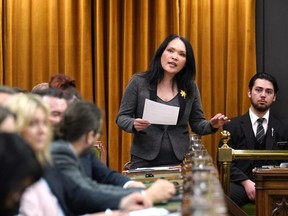Foreign interference tactics in Canada always changing, says target
Douglas Todd: Sometimes China interferes by launching attacks on politicians. Other times it is complimentary, say former MP Kenny Chiu and others

Article content
The Chinese Communist Party is always changing the way it interferes in elections in Canada and other countries, says former Steveston-Richmond MP Kenny Chiu.
The Conservative party politician was the target of a smear campaign during the 2021 election, which took place when many Chinese-language media outlets in Canada labelled him “anti-Chinese” and a “race traitor.”
Recommended Videos
Now, says Chiu, China is trying a different tactic. It is amplifying what he considers favourable messages on the Chinese-language social-media platform WeChat about federal Liberal party leader Mark Carney.
China “will never repeat the same tactic,” Chiu said in an interview. “They won’t spread the same kind of misinformation that they did against me. They are smart. They are resourceful.”
Instead of again attacking a candidate they consider a threat, Chiu said it is shrewd of China to praise one he believes they favour.
Last year, Chiu was a key figure at Canada’s public inquiry into foreign interference, where he said he lost his seat to Liberal Parm Bains because of China’s orchestrated attack on him for pressing Ottawa to establish a foreign-agents registry.
While opposing political candidates in Canada are debating just how positive or neutral the new WeChat posts are about Carney, Canada’s federal election-interference watchdog says there is no doubt Beijing is using them to shape public opinion among Chinese-Canadians and others about the winner of the Liberal leadership race.
The Security and Intelligence Threats to Elections task force announced Monday that the Chinese-language posts on WeChat were “coordinated and inauthentic.” The main headline read: “The United States is facing a tough prime minister from Canada.”
The WeChat post cited how, even though Carney’s rise to leader “has not been smooth,” he has been widely praised for his “quick and effective response” to the 2008 financial crisis, was called a “rock star economist” by British media and had been described as “the only adult in the room” during the Brexit crisis.
The posts, which drew suspicion because they immediately attracted up to three million views, took place through Youli-Youmian, WeChat’s most popular news account. Canada’s intelligence agents link the Youli-Youmian account to the Chinese Communist Party.
This latest revelation of foreign interference has emerged in the wake of polls last year by Angus Reid Institute that found more than two of three Canadians believe former Liberal prime minister Justin Trudeau did not treat the problem of foreign interference with sufficient seriousness.
There are many types of foreign interference, said Chris Tenove, a UBC specialist in election security. The kind focused on Carney, and earlier on Chiu and others, involves covert efforts by foreign governments — whether China, India, Russia or Iran — to distort the public’s views about Canadian party leaders and others.
“The content was being amplified by networks of bots and/or fake accounts. It’s a common technique and part of the general information pollution we live in,” Tenove said.
Even though the WeChat posts about Carney were generally positive, he said, “Given that this network of accounts has been publicly called out before by the government, the actors involved likely knew they would get caught — so it’s hard to know whether they hoped to help or hurt Mark Carney or Pierre Poilievre.”
The WeChat controversy offers an opportunity for the Conservatives under Poilievre to “paint Carney as soft on China,” said Tenove, particularly since Carney made many high-level agreements with CCP officials while head of Brookfield Asset Management.
“It’s fair in this campaign for the Conservatives to claim they would take a tougher stand on China, and to say that we should be alert to Chinese interference as a result. However, these accusations can go too far,” said Tenove.
Even though Tenove believes it is misleading to state that the Trudeau government did nothing to combat Chinese interference, he said the public inquiry determined it was a failing when the government did not provide warnings to people being targeted, including Chiu, Vancouver East NDP MP Jenny Kwan and former Conservative leader Erin O’Toole.
O’Toole, a strong critic of China, maintains nine of his candidates in 2021 may have failed to win because they were targeted by China. Since that left the Conservatives with fewer MPs than under previous leader Andrew Scheer, O’Toole told the public inquiry it contributed to him being ousted as leader and eventually replaced by Poilievre.

Former diplomat Michael Kovrig, who was in Vancouver last week in part to talk about being taken hostage in 2018 by China, has studied that country’s authoritarian leaders’ techniques for foreign interference.
“The Chinese Communist Party uses social media to disseminate disinformation and misinformation and shape public perceptions to advance its objectives. If it thinks one political party will be easier to deal with than another, its online proxies will favour it. WeChat is a very effective way to reach and influence the Chinese diaspora,” Kovrig said in an email.
Regardless of the ultimate aim of the recent WeChat postings, Tenove said one of many illicit aspects of them is they enable foreign actors to reach large numbers of people, often using “computational tricks,” without adhering to Canada’s campaign spending laws.
To broaden understanding of foreign interference, Tenove explained not all of it is covert. Some of it is done publicly by politicians, billionaires, or whomever. And some of it, says Tenove, is okay.
When former U.S. President Barack Obama sent out tweets endorsing Trudeau in Canada’s 2019 and 2021 elections, the UBC expert said it was fair game because Obama wasn’t president and he was not being coercive.
Tenove also said it may be acceptable, if only marginally, for X owner Elon Musk, and U.S. President Donald Trump, to comment on Canada’s election. So far, he said, many believe their behaviour has not yet added up to illicit foreign interference, particularly since Musk has a Canadian passport.
Whatever form foreign interference takes, in Richmond, Chiu says it has already done him permanent damage. When Chiu tried a few months ago to regain the Conservative nomination for Steveston-Richmond, he said he frequently ran into voters who accused him of hating Chinese people.
The nomination ended up going to another person, Zach Segal. Despite his own electoral woes, Chiu considers Segal a friend. He is campaigning door-to-door for him.














Postmedia is committed to maintaining a lively but civil forum for discussion. Please keep comments relevant and respectful. Comments may take up to an hour to appear on the site. You will receive an email if there is a reply to your comment, an update to a thread you follow or if a user you follow comments. Visit our Community Guidelines for more information.